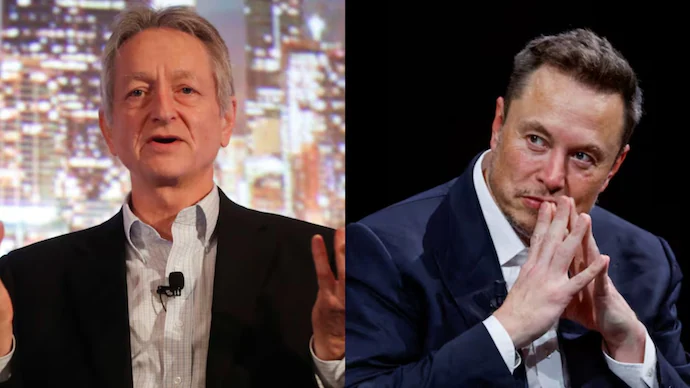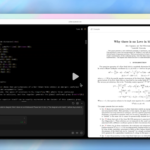Nobel Laureate Geoffrey Hinton, widely known as the Godfather of AI, has issued a stark warning about the growing divide between tech billionaires and everyday workers. According to Hinton, as artificial intelligence (AI) accelerates, people like Elon Musk will get richer due to AI, while millions of ordinary people could face massive job losses. His remarks raise deep concerns about the AI impact on employment, AI and societal issues, and the economic consequences of automation.

AI Boom, Billionaires, and Job Losses
In a recent interview with Bloomberg’s Wall Street Week, Geoffrey Hinton said that the world is entering an era where AI development consequences will reshape the economy. “The big companies are betting on AI replacing human labor because that’s where the big money is going,” Hinton warned.
Hinton’s caution comes as major tech giants—Microsoft, Amazon, Alphabet (Google), and Meta—are projected to spend over $420 billion in capital expenditure next year. Much of that investment is expected to target AI systems, automation, and data centers, fueling both growth and anxiety over AI job displacement.
AI Job Losses: A Growing Trend
The AI layoffs at Amazon, Google, IBM, and TCS have already set off alarms in the tech world. From automation in customer support to AI-powered analytics replacing middle-management roles, the fear of AI replacing human labor is turning real.
Hinton believes this is only the beginning. “To make money, companies will have to replace human labour,” he said bluntly, emphasizing that AI job losses are not a temporary phase but a long-term economic shift.
Elon Musk and the Unequal AI Economy
Hinton pointed out that AI billionaire wealth increase is likely inevitable under current systems. “People like Musk will get richer, while many others lose their jobs — and he won’t care,” he remarked. He clarified that this is not an AI problem, but a societal problem linked to how wealth and opportunity are distributed.
Musk, who owns Tesla, SpaceX, and xAI, has long been an advocate for AI innovation. But as AI and job displacement intensify, critics say that billionaires stand to benefit while ordinary employees face layoffs.
The Economic Impact of AI Development
The AI economic impact extends far beyond the tech industry. From manufacturing to healthcare, automation is expected to increase productivity while reducing labor needs. While AI can boost efficiency, Hinton warns that the benefits may not be shared equally.
He stated, “Musk will get richer and a lot of people get unemployed — and Musk won’t care. I’m using Musk as a stand-in. This isn’t AI’s fault; it’s about how we organize society.”
Hinton’s message underscores a major AI and societal issue: technological progress without social safety nets could worsen inequality.
Balancing AI Progress and Human Welfare
Despite his criticism, Hinton does not advocate halting AI development. Instead, he calls for balanced progress. “AI can do tremendous good too,” he explained, noting that AI can increase productivity in countless industries. But without ethical frameworks and redistribution policies, AI’s economic impact may hurt workers more than it helps society.
He added, “We must rethink how we structure our economy to ensure that as AI gets smarter, humanity doesn’t get poorer.”
Global Implications: AI Replacing Human Labor
Across the globe, governments are wrestling with how to manage AI replacing human labor. Nations like the U.S., India, and the U.K. are discussing universal basic income and re-skilling programs to help workers transition into new roles.
The challenge lies in balancing innovation with employment protection. Experts argue that AI replacing jobs could create new opportunities if handled wisely—but if not, AI job displacement might become one of the most disruptive economic events in history.
The Future of Work: Adapt or Be Replaced
As AI tools become more powerful and autonomous, industries must adapt. Companies investing billions in AI capital expenditure, like Microsoft, Amazon, Alphabet, and Meta, are simultaneously leading the charge and raising ethical questions.
Hinton’s insight serves as a reminder that while AI development consequences can be revolutionary, they also carry risks of inequality. The AI impact on employment will define the next decade — from blue-collar to white-collar jobs.
AI and Society: A Moral Question
For Hinton, the heart of the issue isn’t simply about algorithms or data—it’s about people. The AI and societal issues he raises focus on the moral responsibility of those driving AI forward.
He insists that AI and job displacement shouldn’t be viewed as inevitable destruction but as a chance to reform how wealth is shared in an AI-driven economy.
Geoffrey Hinton, the Godfather of AI, has sounded the alarm: without societal reform, AI replacing human labor will lead to a world where Elon Musk gets richer due to AI, while millions lose their jobs. As AI capital expenditure continues to rise among global tech giants, the world must decide how to ensure AI development consequences benefit everyone—not just the elite.


